So, you’ve got this itch to start a blog. Sounds exciting, right?
But wait… you’re stuck.
Maybe you’re not even sure what to write about. Or perhaps you’ve got an idea but are unsure if it’s any good.
Does that sound like you?
Well, you’re not alone. Lots of people feel this way when they’re starting out.
Picking what to write about – choosing a blog niche – can feel like trying to solve a super hard puzzle. It’s even tougher than all the technical stuff!
Maybe your brain’s buzzing with tons of ideas. Or maybe you’re sitting there, staring at a blank screen, feeling lost.
Whether it’s a flood of ideas or a total blank, we’ve got your back no matter what’s holding you back. Together, we’ll figure out the perfect niche for your new blog.
Let’s dive in and make this blogging journey super fun and exciting!

Table Of Contents
1 What is a Blog Niche?
A blog niche refers to a specific topic, subject area, or theme that a blogger focuses on within their blog content.
Essentially, the specialized area of interest sets a blog apart from others and defines its core focus.
Well, picture yourself scrolling through Instagram or surfing the web. You’re looking for something specific, right?
Maybe it’s fashion inspiration, cooking tips, or travel advice. You’re not interested in random ramblings that have nothing to do with what you’re searching for. That’s where a niche comes in handy.
Choosing a niche helps you attract the right audience and sets you apart from the crowd. You become known as the expert in your niche, the go-to resource for anyone interested in that topic.
Plus, it makes your content more focused and valuable to your readers, which keeps them returning for more.
1 Why Do You Need a Blog Niche?
You might be thinking, “Isn’t the whole point of a blog to share whatever’s on my mind whenever I feel like it?”
Well, technically, yes.
But here’s the thing – while the internet is vast and forgiving, your readers might not be as forgiving.
Audiences come to your blog looking for something specific. They want answers, insights, or entertainment on a particular topic.
If your blog is all over the place, covering everything you know, you might lose their interest faster than you can say “Google search”.🤭
So, you need to decide on a blog niche that essentially defines your blog’s focus, theme, or subject matter.
3 How to Choose a Profitable Blog Niche
Let us now discuss how to choose a profitable blog niche.
3.1 Brainstorm the Niches
Start by reflecting on your interests, hobbies, and passions. What topics do you find yourself naturally drawn to? What activities do you enjoy doing in your free time?
Consider jotting down anything that comes to mind, whether it’s cooking, gardening, fashion, technology, or travel.
Explore each industry and brainstorm specific blog niches or subtopics within them that you can potentially explore in your blog.
Consider the needs, problems, and pain points of your target audience. What challenges are they facing? What information are they searching for?
By understanding your audience’s needs, you can select niches that address those needs and provide valuable solutions or insights.
And finally, it’s important to choose a topic that genuinely interests you or in which you possess expertise.
A good blog niche should have high Traffic Potential (TP), which estimates the search traffic the top-ranking site receives for your keyword. Additionally, a low keyword difficulty (KD) is desirable, as it indicates how challenging it will be to rank on the first page of Google for that keyword.
For instance, let’s say you’re considering starting a blog about vegan recipes. Using keyword research tools, you find that the keyword “easy vegan recipes” has a high TP, and the keyword “quick vegan dinners” has a low KD. This suggests that there’s a considerable audience actively searching for content related to vegan recipes, making it a promising niche for your blog.
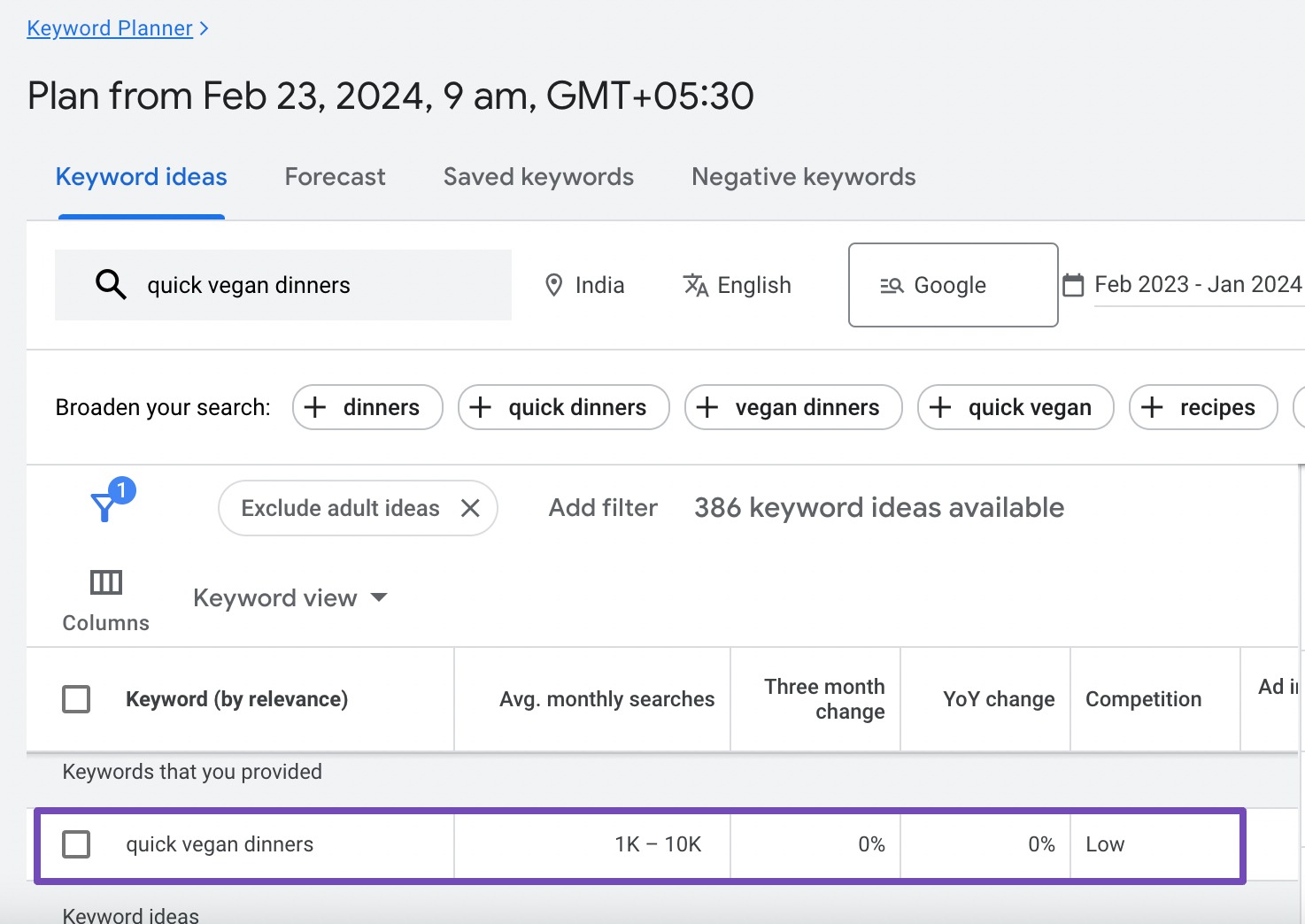
Niche Based on Professional Knowledge and Experience
Choose a niche based on your professional experience. Your expertise adds credibility to your blog and enables you to provide valuable insights and create content that truly connects with your audience.
It’s important to have a good understanding of your topic so that your audience can trust you.
Failing to do so may lead to difficulty ranking your content on Google. This is because Google’s E-E-A-T principle emphasizes the importance of “Expertise” and “Experience” in determining the quality of a webpage.
For example, if you’re a certified fitness trainer interested in starting a blog about exercise and nutrition, your expertise in fitness and nutrition will be invaluable. You can share workout routines, dietary advice, and tips for leading a healthy lifestyle based on your professional knowledge and experience.
By leveraging your expertise in your chosen niche, you can create informative, engaging, and valuable content for your audience, ultimately establishing yourself as a trusted authority in your field.
Niche Based on Personal Experiences
Selecting a blog niche based on personal interests allows you to pursue your passions and hobbies while creating content that resonates with you and your audience.
This approach allows you to create content that you’re genuinely enthusiastic about, which can translate into more engaging and authentic blog posts.
For instance, if you’re an avid traveler with a love for adventure, starting a travel blog can be the perfect niche for you. You can share travel stories, destination guides, and travel tips, drawing from your adventures to provide valuable insights and inspiration to your readers.
Niche Based on Random Ideas
Exploring niche based on random ideas involves considering diverse topics that may not initially align with your interests or expertise but have the potential to attract an audience.
For instance, you might start a blog about unusual hobbies like urban beekeeping, vintage book collecting, etc.
The key is to conduct thorough research to evaluate market demand and potential audience interest in these niche topics.
Niche Based on Products
Choosing a niche based on products involves focusing your blog content around specific types of products or product categories.
You can navigate to Amazon, research some of their product categories, and check if anything interests you.
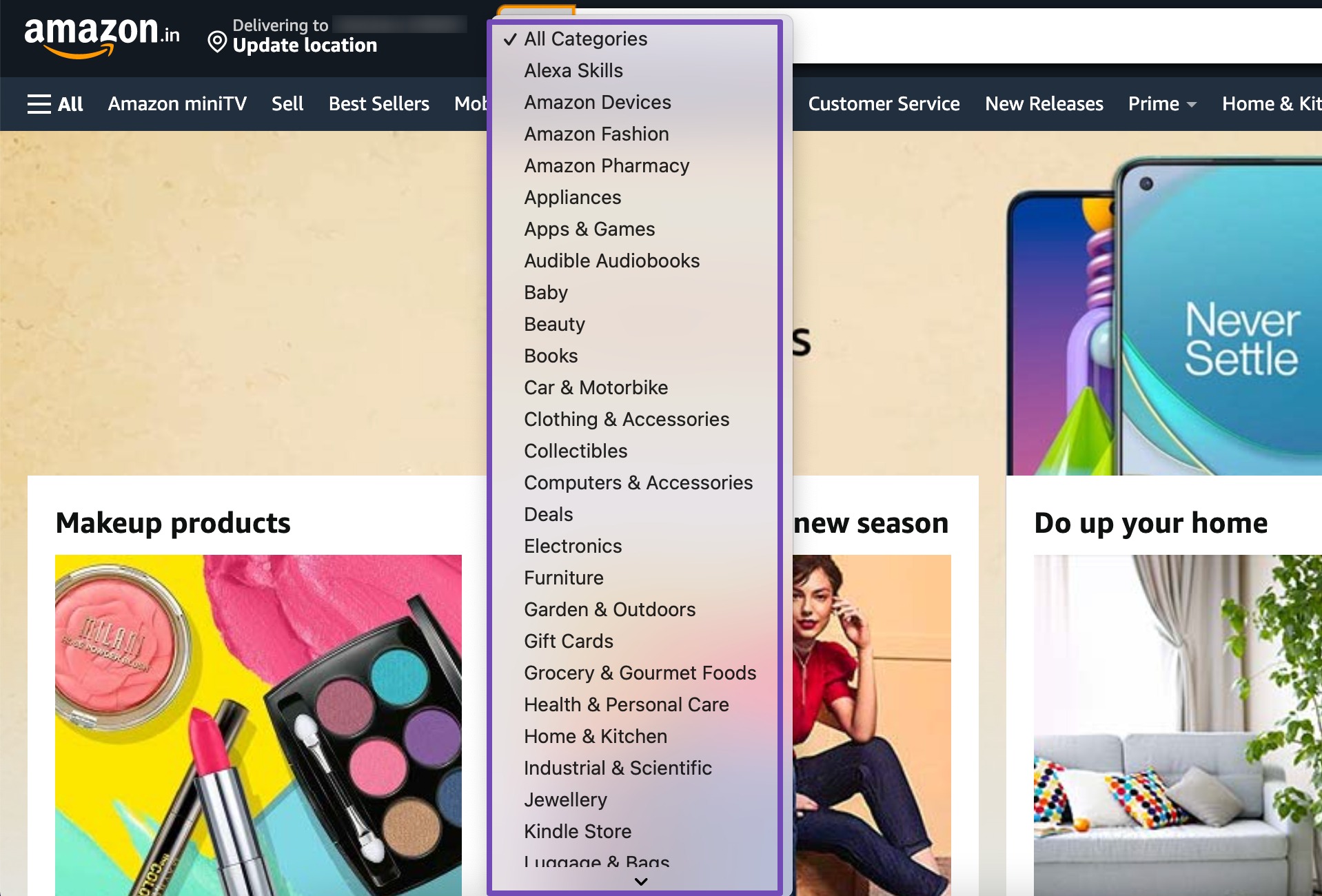
You can also visit the ShareASale affiliate site, create an affiliate account, and promote the products. These products can also be your niche idea.

Also, online courses that you’ve attended can be your next blog niche topic. You can check Udemy, and the topics in the category or a subcategory can also be a niche as well.
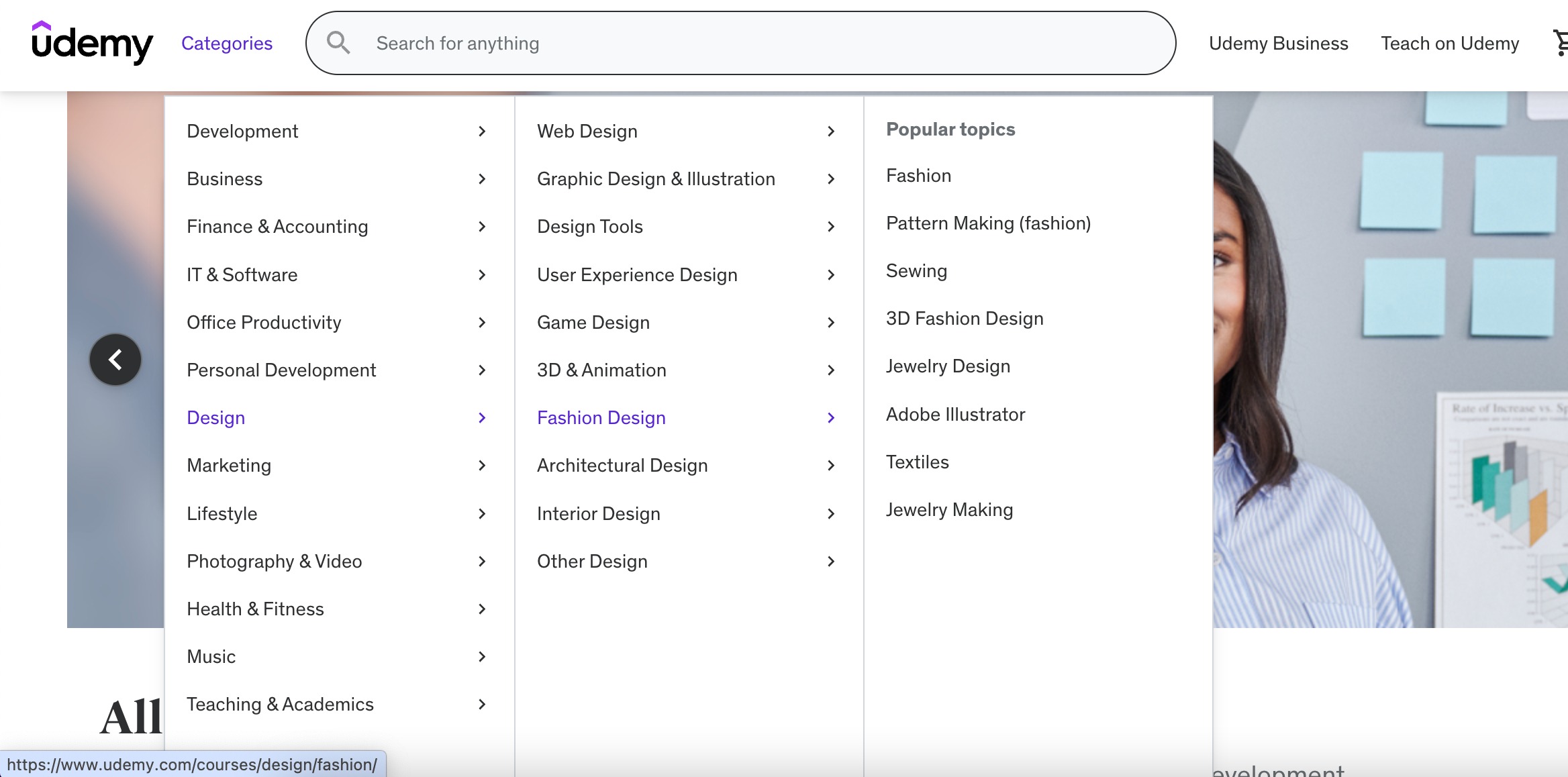
Explore the Sites on Sale
An alternative method to uncover potential niches is by browsing through websites listed for sale. Visit platforms like Flippa or Empire Flippers and explore their marketplace.
Take note of the trending niches and review their monthly revenue figures.
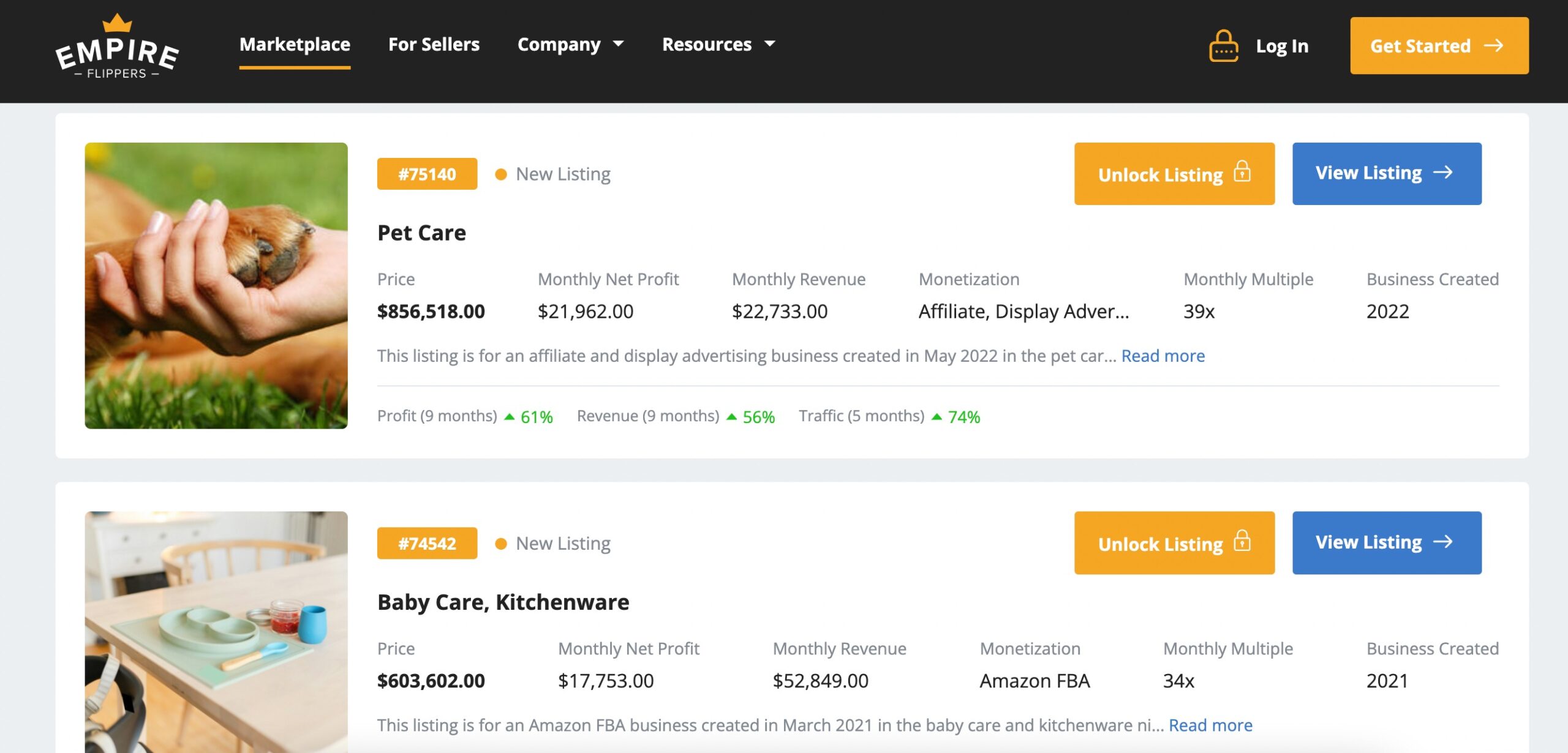
Niche Based on Magazines
You can draw inspiration from magazine articles, features, and columns to create engaging and informative content for your blog niche.
For instance, exploring online magazines like SwimmingPoolNews, which covers topics related to pools, spas, and hot tubs, can offer valuable insights.

When an industry supports a niche magazine like this, it often indicates that the niche is lucrative and has the potential for profitability.
3.2 Niche Validation
The next step involves validating the chosen niche.
Niche validation involves assessing various factors to determine a chosen niche’s viability and potential success. Let us discuss the tests you can perform to validate your niche.
Test 1: Search Volume
It is important to determine if there’s significant search volume within your blog niche. One way to do this is by identifying content-rich websites with high search volume, particularly those specific to your micro-niche.
For example, you’re passionate about hiking and want to start a blog on hiking trails. Conduct a Google search for “best hiking blogs”, and you’ll likely find several recommended blogs dedicated to hiking.
Visit these blogs and evaluate their content depth and search traffic.
You can use tools like Similarweb to analyze the website’s traffic metrics. Enter the site’s domain name and click search to gather insights into its search volume and overall traffic. This can help validate the existence of search volume within your chosen niche.
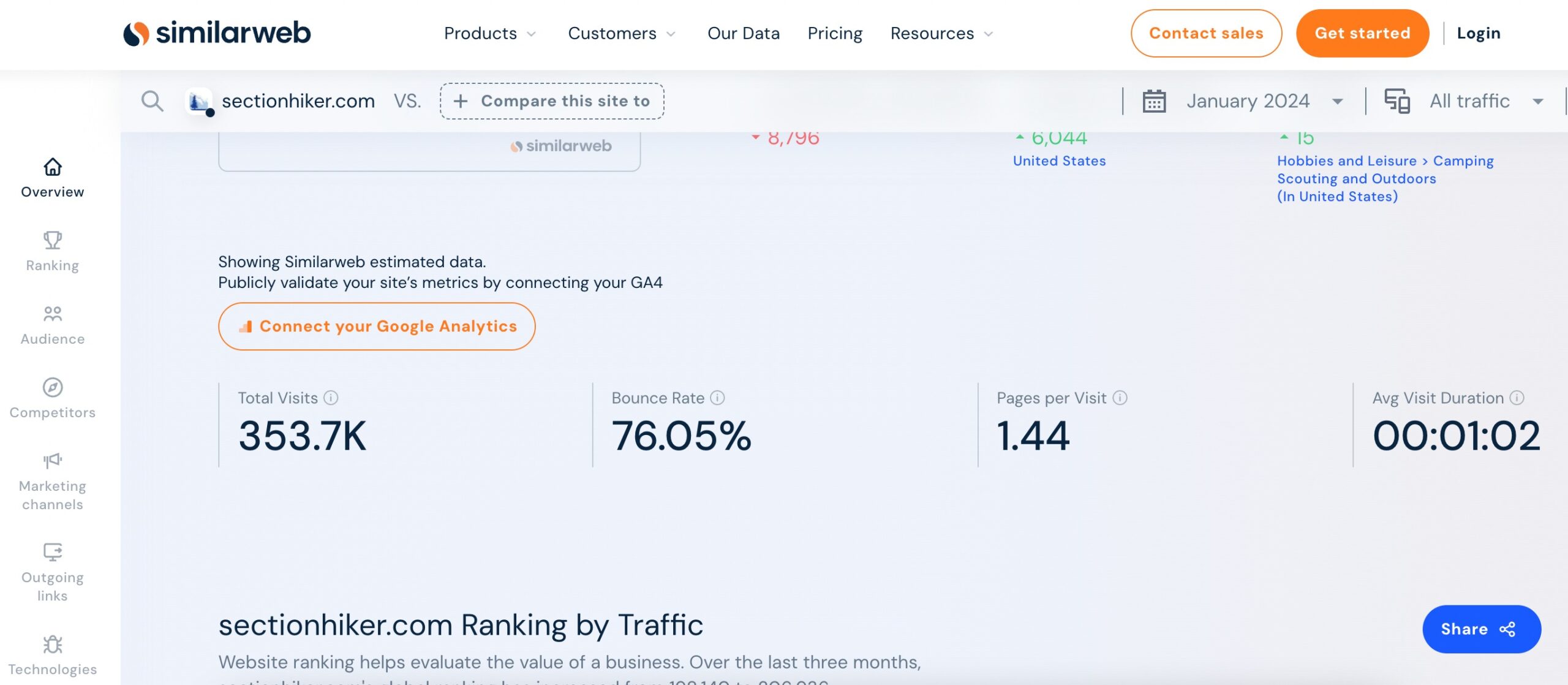
Test 2: Profitability
To ensure your blog niche is profitable, it’s necessary to understand the revenue streams of successful websites.
Blogs can generate income through various methods, including affiliate marketing, where you earn commissions by promoting products to your audience. For instance, if you run a fitness blog, you can promote workout gear or nutritional supplements and earn commissions on sales made through your affiliate links.
Additionally, blogs can monetize through Google Ads, direct product sales, coaching services, consulting, and subscription models. For instance, a blog focused on personal finance can offer financial coaching services or sell digital financial planning guides.
To determine the profitability of a niche, consider the availability of products and services you can promote to your audience. A niche with a wide range of relevant products offers greater potential for generating income through affiliate commissions and sales.
Test 3: Competition
Next, you need to evaluate the level of competition within a particular niche to determine the feasibility of establishing a presence and standing out from competitors.
Find the blog topics that are specific to your micro niche. Enter your micro-niche topic into Google Trends to look for its popularity and search interest over time.
For instance, if you’re considering a micro-niche topic like “vegan meal prep,” Google Trends can show you how interest in this topic has evolved over time and whether it’s experiencing a steady increase in search interest.
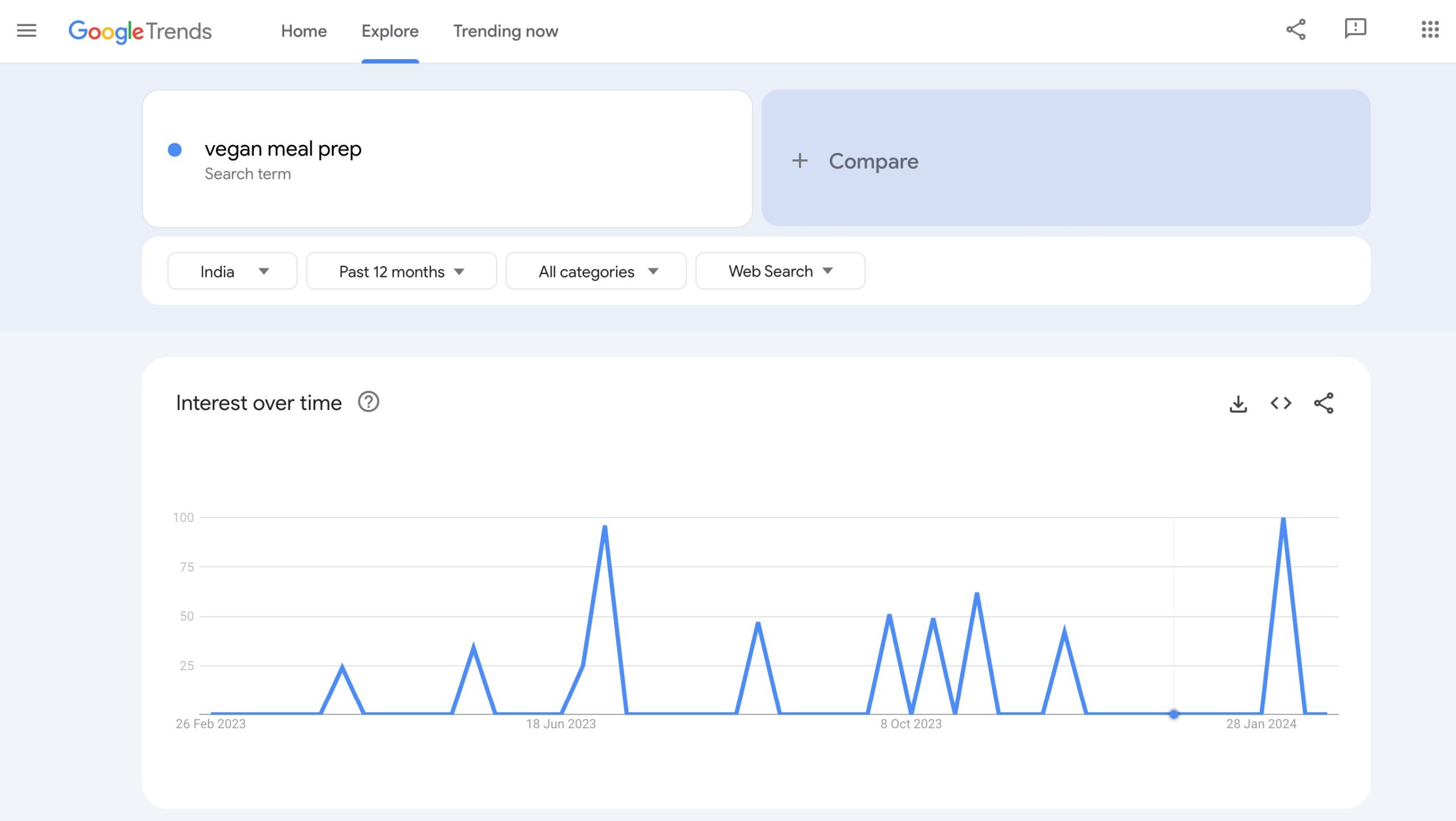
You can further check for that particular keyword using the Ubersuggest Chrome extension.
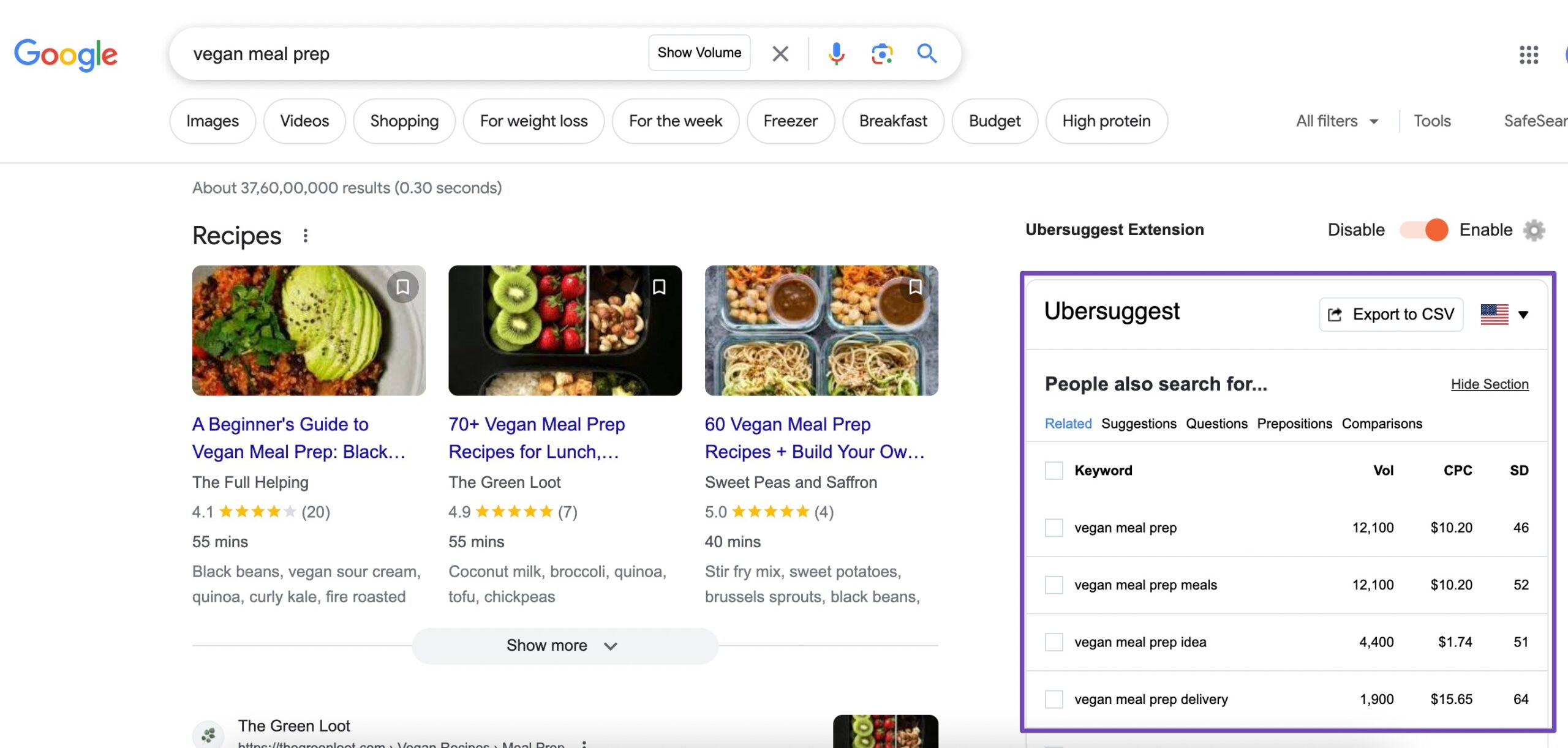
With the help of the extension, analyze the domain authority, backlink profile, and organic traffic of competing websites. This information can help you judge the strengths of your competitors and identify opportunities to outperform them.
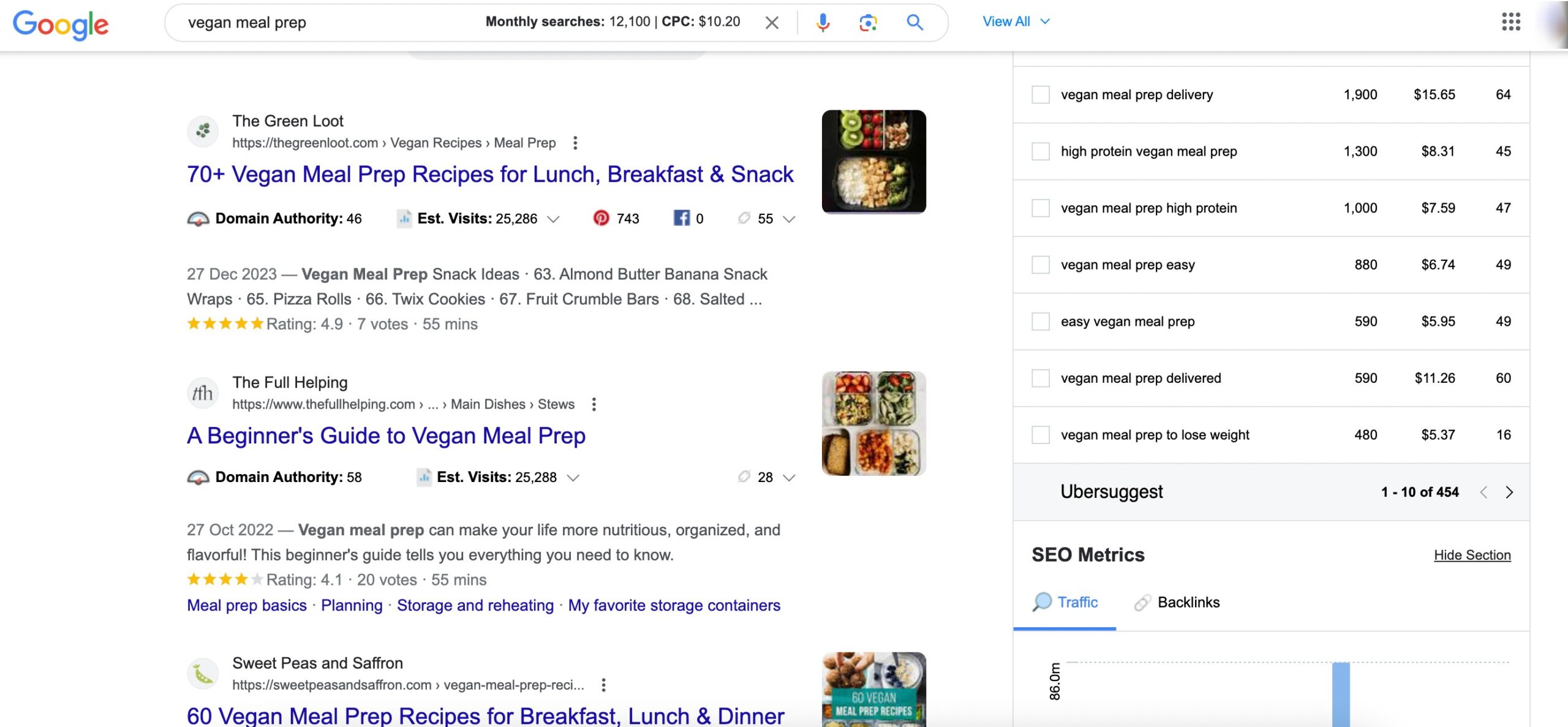
Test 4: YMYL Topics
YMYL (Your Money Your Life) topics are those that have a significant impact on a person’s health, finances, safety, or overall well-being.
Validating a niche involves considering whether the chosen topic falls within the YMYL category, as these topics often require higher expertise, authority, and trustworthiness.
Niches related to medical advice, financial planning, legal guidance, etc, fall under the YMYL category. It’s essential to ensure that you have the expertise and credibility to provide accurate and trustworthy information on these topics.
We do not recommend YMYL (Your Money or Your Life) niche topics, especially for beginners. This is because search engines like Google rely on various indicators across the web to determine content credibility.
For instance, in health-related topics, search engines look for signs of expertise, such as appearances on medical blogs, podcasts, interviews, and other reputable platforms, to determine the credibility of the author.
4 Conclusion
Picking a blog niche isn’t just about narrowing your focus; it’s about building a loyal following and establishing yourself as an authority in your chosen field.
A scattered approach risks losing your audience’s interest. Sure, they might enjoy one post, but they’re less likely to stick around if they can’t predict what’s coming next.
So, take the time to explore different niches, do your research, and find what resonates with you and your audience.
Remember, choosing a blog niche isn’t just about narrowing your focus – it’s about setting yourself up for success and creating meaningful connections with your readers along the way.
If you like this post, let us know by Tweeting @rankmathseo.
